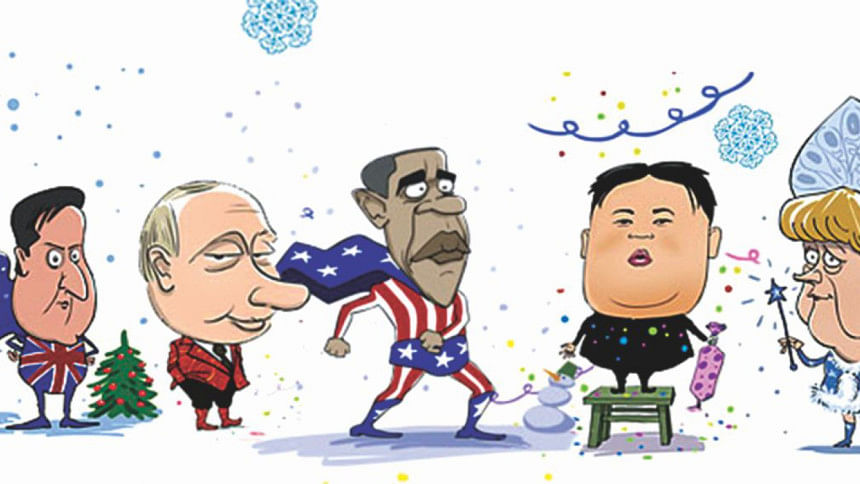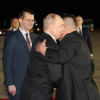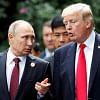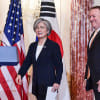The Strongman returns

It should be no surprise to us that the political 'strongman' has resurged. The very word evokes images of a bare-bodied Vladimir Putin on horseback: a veritable Hercules of politics! Granted that it is an image that the western media cultivates – there is little recourse but to admit that a president who can nonchalantly annex a province of a neighbour is a strongman. So is the leader who promises the abolishment of a weaker neighbour if he is elected. That was Benyamin Netanyahu, if you were wondering.
A political 'strongman' is essentially a political leader who – even if operating within democratic bounds – rules by force and with a sense of entitlement. They are most akin to tribal chiefs, commanding loyalty and arbitrating morality. Before the Industrial Revolution, it was not uncommon for nations' leaders to be warrior-conquerors and moral-judges at the same time. Therefore, military leaders had long been thought of as strongmen. But things have changed. I would venture the qualification that modern strongmen are distinct from warlords, dictators or monarchs, in that they operate under the veneer of democratic structures and institutions. They prevail during 'terms' not 'reigns'. They stage 'elections', not 'coronations'.
There is a tendency to limit the term to certain regions only (namely, Africa and Asia). But with the global right-wing resurgence, strongmen are floating to the forefront in every corner of this fractured, post-globalisation world. While many of the earlier strongmen did come to power through revolutionary means, the contemporary ones are often elected into office through elections. Strongmen leaders often evade the labels of 'dictator' or 'autocrat' because popular understanding of dictatorships concentrates on the manner of 'ascension', not the manner of 'rule'.
A recent Financial Times op-ed named seven statesmen who are shaping contemporary geopolitics: Vladimir Putin (Russia), Xi Jinping (China), Abdel Fattah al-Sisi (Egypt), Recep Tayyip Erdogan (Turkey), Shinzo Abe (Japan), Narendra Modi (India) and Benyamin Netanyahu (Israel) – all sharing similar characteristics and styles of governance. Not long ago, Thaksin (Thailand), Mahathir (Malaysia), Rajapaksa (Sri Lanka) and Gbagbo (Ivory Coast) had all been dubbed strongmen. Latin American actually has a term for such leaders: Caudillo. Strongmen are also frequently women, some examples being Indira Gandhi (India), Thatcher (UK), Merkel (Germany) and Suu Kyi (Myanmar).
Political strongmen have been known to share certain attributes: humble beginnings, right-wing politics, messiah complex, official personality cults, promises of (ruthless) progress, dislike for critical media and penchant for moral legislation. A key attribute is a preference for a 'nationalist' view of their countries. In the post-Cold War era, national, communal or religious appeals are used to cultivate tribal loyalty in the masses. Narendra Modi's campaign evoked the glorious past of a Hindu India. Turkey's Erdogan is reviving the glory of the Ottoman Empire. Donald Trump is feeding the fear of Islamisation and 'making America great again'. These characters are products of their times and seek to capitalise on sentiments of anxiety and longing for reclamation of a civilisational past.
Strongmen drive a ruthless development agenda. Rwanda's Paul Kagame – who grew up in a refugee camp – has reduced child mortality by 70 percent, grown the economy at 8 percent, established a national health insurance programme and rallied for more women in political office. Today, Rwanda has the highest percentage of female parliamentarians in the world. However, Kagame is also allegedly engaged in cracking down on citizens and covertly supporting violent rebel groups. In Hungary, Viktor Orbán's government regards its protectionist policies as a form of 'patriotism'. For political strongmen, 'progress' is both the goal and justification.
Turning 'tribalism' into a 'cult' requires strongmen to nurture and promote an adversarial view of neighbouring nations. Their own nations have no friends, only interests. They may also adopt oppressive stands against minorities. Erodgan, for example, is known to persecute the Kurds, which helps unite and consolidate his primary constituency. Peace Prize winner Suu Kyi has been hauntingly silent on the disenfranchisement and persecution of the minority Rakhine people. Modi's administration – cruising on the promise of economic progress – has imposed Hindu scripture study in schools, condoned attacks on churches and banned beef to appease his core constituency. Of Modi, India Today editor writes, "The way to govern this complicated country is to engage in discussions and win arguments with those who disagree" rather than "squashing dissent" and orchestrating a cult of personality."
Strongmen have a tendency of breaking diplomatic norms, especially those established in the wake of WW2. Putin's annexation of Crimea, Kagame's disregard for his own constitution and Modi's breaking with India's long tradition of secularism point towards willingness to defy expectations. Hungary's Orbán has adopted protectionist economic policies, exerted control over media and cracked down on donors and NGOs funding civil society organisations. An avid footballer, he has been using legislative influence to raise donations for a mega-stadium just across his residence. Because they operate like dictators but appear similar to democratic leaders, strongmen are seldom shunned from the corridors of international power and diplomacy.
Strongmen also exert control over media's framing and reporting, e.g. to help introduce nuances of 'fatherly benevolence' to stories about their authoritative rule. Thus, political strongmen are defining a new mode of government that is an isomorphic mimicry of democracy, but no different from a dictatorship. Consider this: Egypt's Sisi led a coup to depose the elected Morsi administration and assume power – in order to 'rescue the Egyptian people'. He suspended the Constitution and imprisoned leaders of the ousted government. But it was not long before he organised a (questionable) election and flung a garb of democratic legitimacy over his military regime. The international community has now wholeheartedly endorsed Sisi's regime, unhesitatingly doling out financial aid and shipping armaments to Egypt.
In wake of a new strongmen era, what is odd is that it also means that mass tolerance, if not preference, for such characters has grown steadily. Undoubtedly, two protracted, multi-country wars, a lingering recession and the spectre of international terrorism have substantially moulded public sentiments and fears.
It seems like more and more people are now willing to trade loyalty for direct benefits to their group or community. Jason Stanley argued on the NYT, "[these] voters are simply more attracted to a system that favours their own particular religion, race, gender or birth position."
In the past half-century, gentle, receptive leaders with egalitarian agendas and liberal sensibilities have lacked either a robust development agenda or the will and/or power to push it through. Diplomacy and dialogue have made no dents on the growing menace of terrorism. Informed advocacy and journalism has not deterred unsanctioned surveillance or attacks on foreign soil. To a world that perceives the chasms to be widening, a leader who dictates and acts may be preferable to one who orates and consults. The preference for 'doers' over 'thinkers' is not incongruent with the dynamics and sentiments of modern industrialised nations.
In The Republic Plato predicts that a 'towering despot' will invariably rise in any democracy; feeding the fears of dominant groups, (s)he will declare himself the 'protector', thus (s)he will usurp power and limit freedoms. What we are witnessing may be a number of countries simultaneously reaching this critical stage. It is easy to view the resurgence of strongmen as socio-political immaturity or devolution; or as a temporary digression in the wake of worldwide conflict and recession. But a more realistic possibility is that the 'strongman' is an enduring archetype that will emerge and fade based on political needs. In Latin America, the era of caudillos is virtually over. The branded strongmen of the Middle-East have fallen (but they are not necessarily irreplaceable). Cambodia's estranged strongman Hun Sen has been facing a popular uprising and was recently found buying Facebook 'likes' to puff up his online image. Global governance is in flux. As one set of strongmen bows out, others will rise elsewhere. The resurgence of strongmen may point to market demand for democratised dictators; or it may herald a new political reality in the post-Cold War era.
The writer is a strategy and communications consultant.

 For all latest news, follow The Daily Star's Google News channel.
For all latest news, follow The Daily Star's Google News channel. 








Comments